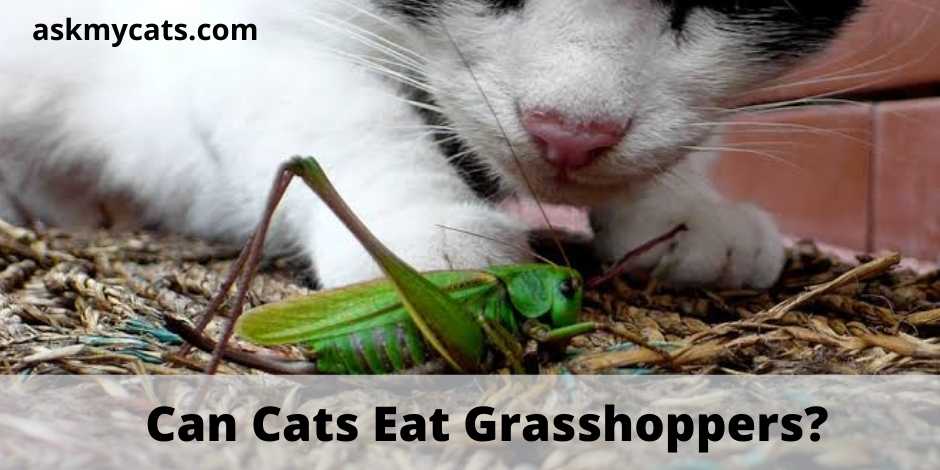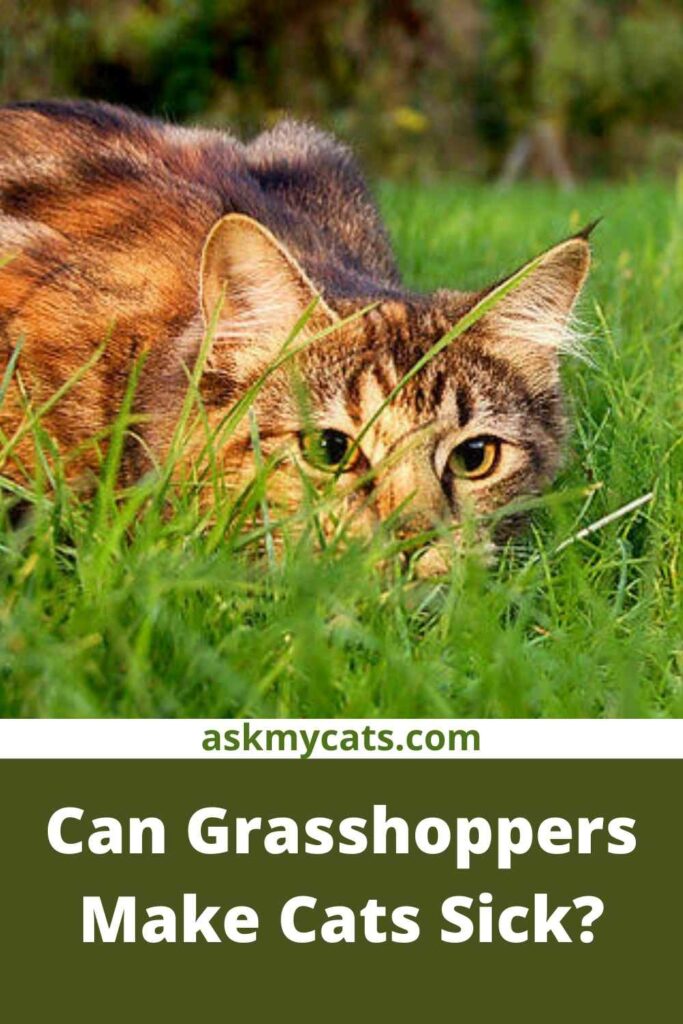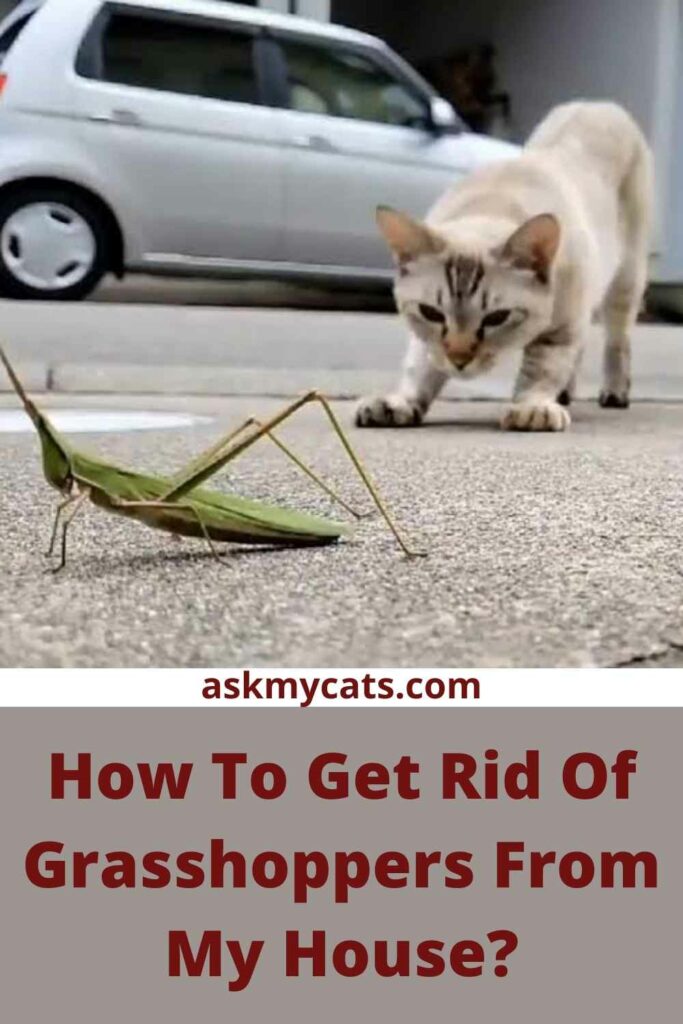Cats chasing bugs and insects about the yard are entertaining to watch. Hunting, chasing, and playing with their prey is in their genes and they also consume what they catch.
If you’ve ever seen your cat eat a grasshopper, you may be wondering if cats can eat grasshoppers and if it is bad for their health.
The good news is that grasshoppers are safe for cats to consume. By safe, we don’t mean it’s okay to witness your cat eat a grasshopper since that’s revolting, but it should be acceptable for their health.
It is quite normal for a cat to eat grasshoppers because it is part of their innate predatory tendencies.
A cat will very certainly try to grab an insect that is leaping about, strolling past them, or flying within reach.
In this article, we will elaborate and inform you about the relationship between your beloved feline and grasshoppers, so keep reading!


Give Your Cat the Perfect Day
Get the Free Ebook!
Should I Let My Cat Eat Grasshoppers?
It’s fine if your cat consumes a couple of grasshoppers while hunting. Cats are usually unaffected by hard-bodied insects like grasshoppers.
Ingesting their exoskeletons, on the other hand, can induce mouth discomfort and gastrointestinal distress. They might also be carrying parasites that are harmful to cats.
Grasshoppers should not be used to replace a cat’s regular diet, but it wouldn’t hurt if your cat ate one whenever it got the chance.
Just make sure she stays away from the brightly coloured ones, since they are toxic and can be poisonous for her. The green and brown ones, on the other hand, are fine and pose no threat to your cat.
What Happens If A Cat Eats A Grasshopper?
Grasshoppers, for example, are usually non-toxic to cats and pose little harm to their health. Ingesting their exoskeletons, on the other hand, can induce mouth discomfort and gastrointestinal distress.
Cats are known to consume what they capture. Many cats like eating flies, spiders, grasshoppers, ants, crickets, and other insects. In most cases, there is no danger in doing so. The majority of home and garden pests aren’t hazardous to cats.
So, we can safely say that eating a grasshopper possesses no health hazard to your cat in general.
Can Grasshoppers Bite?
Grasshoppers aren’t known for biting. However, certain kinds that congregate in huge swarms may bite when they swarm.
If they feel threatened, other varieties of grasshoppers may bite too.
Grasshopper bites aren’t toxic, and they’re not hazardous. They do, however, have powerful jaws. It might be excruciatingly uncomfortable for a short time for your feline.
What To Do If A Grasshopper Has Bitten My Cat?
If your cat has been bitten by a grasshopper, you can treat her as follows:
- Remove any debris from the bite that the grasshopper may have left behind.
- Clean the area gently with soap and water.
- Place a cold compress or ice pack on the bite and elevate the afflicted region if there is any edema.
- Do not allow your cat to scratch the bite area until it heals.
Grasshopper bite symptoms should disappear within a few days.
However, we do recommend that you visit a veterinarian in order to provide your feline with the best care.
Why Do Cats Eat Grasshoppers?

Cats don’t consume bugs for protein, as much as you may like to give them credit for. Rather, chasing, killing, and eating bugs is all part of your cat’s natural hunting drive.
Although most domesticated cats do not have the opportunity to hunt for their food, the impulse still exists.
Cats like following, chasing, or pursuing their preys, as well as capturing or pouncing them. They frequently take use of not just their keen vision but also their excellent hearing, which can detect even the tiniest movement.
You may fill their life with numerous toys, but their innate senses can locate bugs, and following them will provide them with greater delights.
Cats do not search for insects because they are hungry, as insects are not an excellent source of nutrition for felines, but it is part of their natural habit.
Their brains have evolved to chase and catch any tiny, fast-moving prey, and this instinct does not fade with domestication.
Most of the time, after chasing a particular bug, they are unlikely to consume it. They may bite them, but they will not consume them. Hunting is more of a pastime or a method to pass the time.
Can Grasshoppers Make Cats Sick?

There’s always the possibility that a grasshopper will make your cat sick. If this happens, it should be a one-time occurrence, and your cat should learn its lesson.
Some people are concerned about insects transmitting internal parasites to cats, although this is seldom the case.
Exterior insects and bugs, such as fleas and ticks, are far more dangerous to your cat, therefore you should concentrate your efforts on keeping them free of external parasites.
Except for the grasshopper’s exoskeleton, which may irritate their mouth or cause stomach issues, especially if your cat consumes a lot of them, grasshoppers are harmless.
So, the next time you see your cat eating a grasshopper, just turn away if it disgusts you, but don’t worry about any negative consequences.
Can Grasshoppers Kill Cats?
Grasshoppers, in addition to moths, are a common insect eaten by many cats. They provide a pleasant hunting challenge for your cat.
They’re typically safe for your cat to consume, however too much of them might cause tummy discomfort.
You may breathe a sigh of comfort knowing that grasshoppers will not harm or kill your cat. She will, at the very least, have an upset stomach and be irritated.
What Are The Possible Risks If My Cat Eats A Grasshopper?
While certain insects and creepy-crawly species are perfectly fine for these animals to consume, there are a few basic issues.
- Irritable bowel syndrome, vomiting, and diarrhoea. If it doesn’t go away in a day or two, see your veterinarian.
- Some grasshoppers may have intestinal parasites, such as stomach worms like tapeworm. This danger, however, is quite minimal.
- Some may sting or bite your cat, producing anaphylaxis or localised allergic responses.
- Insecticides may be used to control certain of them. These, on the other hand, are unlikely to harm your cats and will only cause moderate stomach discomfort.
If you’re going to use pesticides to get rid of these pests, make sure you read the label. Some of them are harmful to your feline companions if they come into close touch with them.
How To Get Rid Of Grasshoppers From My House?

You can use one of the following techniques to keep grasshoppers out of your garden or house:
- Make a small boundary around your grass using your mower. This may deter grasshoppers because there isn’t much left for them to eat.
- Plant grasshopper-attracting plants, such as zinnias, around the perimeter of your garden. This can help keep grasshoppers away from the garden’s perimeter.
- To prevent grasshoppers out of your yard, spray pesticide around the perimeter.
Targeting the breeding areas where grasshopper eggs hatch is the greatest approach to get rid of grasshoppers. The ideal time to accomplish this is in May or June.
Grasshoppers can be controlled with insecticides, but you’ll probably need more than one application. To assist attract grasshoppers, combine a pesticide with canola oil or bran.
There are other natural pesticides that work against grasshoppers, such as spinosad. If you’re going to use pesticide, make sure to read all of the instructions and dangers on the label.
Using Nosema locustae, a bacterium that causes illness in grasshoppers, is another approach to get rid of grasshoppers. Grasshoppers can be infected and killed with Nosema locustae spores mixed with bran or other bait.
Grasshoppers can also be exterminated by hand. You may just have a handful in your yard or house because they are generally solitary.
If you’re comfortable doing so, you can take them off the plants by hand and place them in a basin of soapy water to kill them. To prevent being bitten or assaulted by their prickly legs, pick them up carefully.
Frequently Asked Questions
Are Grasshoppers Toxic To Cats?
Cats are usually unaffected by hard-bodied insects such as grasshoppers. Ingesting their exoskeletons, on the other hand, can induce mouth discomfort and gastrointestinal distress.
Can Cats Survive Eating Grasshoppers?
Grasshoppers are generally safe for pets to consume. However, it should not replace their natural diet as consuming grasshoppers do not provide them with the needed nutrients.
Why Is My Cat Eating Grasshoppers?
Grasshoppers, in addition to moths, are a common insect eaten by many cats. They provide a pleasant hunting challenge for your cat. They’re typically safe for your cat to consume, however, too much of them might cause tummy discomfort.
Final Words
Grasshoppers are a common bug that may be found all over the world. They may cause damage to your lawn or garden, but humans and animals are rarely harmed unless they feel threatened.
They may bite, kick, or vomit if they feel threatened. Insecticides, as well as just cutting a boundary around your lawn, can help keep grasshoppers at bay.
Your cat is generally safe around grasshoppers. They do not possess any kind of serious threat to your feline. So you can rest easy.
Drop down your doubts and queries in the comment section below. We will get back to them soon!
